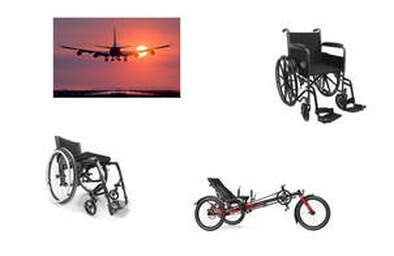|
This will be my last update for 2017 (the chronological year, not the academic one), so you will not hear from me now again until next Spring (i.e. January 2018). In this SEN Update, you will find Sections entitled:
I have deliberately only written four sections in this update (rather than my normal five) because they are a bit lengthier to read. But as I always say, I know how busy everyone is, so please feel free to read just the sections that are of interest to you or read everything; the choice is always yours. (Don’t forget, to ensure that you never miss out on one, you can get my SEN updates personally by completing your email details below, by using our App (SEN.fyi), or by following me on one of the Social Media platforms that I use listed at the top/bottom of this page. You can also easily share this update with others (please only do this if it may be relevant to them), by using one of the icons to the right of/at the bottom of this page (if on a mobile device) or on our SEN.fyi App (by using the ‘share’ feature at the bottom of the page). THE SAME BUT DIFFERENT (NEW SEN LAW CONFERENCE) Some of you will know that for over two decades, Jordan Publishing has held an annual SEN Law and Practice Conference ever year, usually in the first week of March. Personally, I have spoken for Jordans (as it has come to be known) for the past 13 years, and have actually also always attended the whole day-long conference myself, as I have always found it very useful to hear from other speakers/practitioners in the SEN field about what is happening about SEN law. The Jordans conference has historically always been well-attended, (people working in the SEN field also see it as a ‘must got to’ networking event), with a range of excellent speakers, not only solicitors, barristers and Judges working in the SEN field, but representatives from Government, Local Authorities (LAs) and parental organisations. It has always had its 'finger on the pulse' of SEN and there have always been good sessions providing analysis of SEN practice and procedures, together with good casework updates, to name but a few things. However, the Jordans conference has also been said to be too expensive for some people. Unfortunately, Jordans were taken over last year prior to their (now) last conference. Their new owners have decided to no longer hold an annual SEN conference from 2018. But I am glad to say that I have now joined up with the education law barristers from Matrix Chambers and also the charity, IPSEA (Independent Parental Special Educational Advice), in order to now stage a new annual SEN Law conference, which we plan to launch and take place next Spring in London on Tuesday 6 March 2018. The venue and speakers are not confirmed as of yet, but what I can tell you so far is that it, again:
I am very excited about this venture. We are hoping to not only attract the same audience as before (i.e.lawyers and those from schools/colleges/LAs/parents organisations etc.), but now also make it more accessible to as many other people as possible (both parents and professionals). We are hoping that it will again also become the ‘must go to’ event for anyone working or interested in SEN law (whether personally or professionally) and that it will also serve as a valuable opportunity for different (and similar) people in the field of SEN to get together once a year, in the years to come. We are not sure as of yet how many people will be coming and whether we should hold the conference just in London, or should also put it on again in somewhere like Manchester (we realise that many seminars/conferences are in London and can be very expensive (both in time or cost) for those commuting from the north to attend). THINGS WE DON’T (BUT SHOULD) TALK ABOUT (MENTAL HEALTH ISSUES) This section of my update is a bit different from my normal ones (for example, where I like to share information, try to put forward a solution to a problem or give an analysis of something). Today, I really just want to highlight an issue that has been on my mind a lot these past few years, so that we can hopefully start to talk about it. I guess that I really just want to also get people thinking about it a bit more. The world has really changed a lot in the past decade or two, hasn’t it - mainly with the advent of rapid advancements of new technology, particularly through the increasing access to and use of the internet. It is almost like there has been a quiet revolution going on and we have just accepted it! I certainly do not criticise the proliference of the internet with the now immediate access to the vast amounts of information we have at our finger tips, together with our ability to use emails, smartphones, tablets etc., but I have also seen a rapid rise in the use (and misuse) of Social Media. This seems to have now become an almost obsessive compulsion for many children and young people during the past decade or so, even though many Social Media tools have not really been around for that long (it may surprise you to learn that Facebook actually only launched in 2004 and Twitter in 2006, but others like Instagram only started in 2010 and Snapchat in 2011). But we have seen the rise during this time of substantially more mental health difficulties in children and young people (mainly teenagers, although teenage years can now seem to sometimes start during primary school!), especially during the past 5-10 years. I know that many people put this down to the increased use of Social Media, which I tend to agree with - I have seen these pressures on children and young people (for example, their peers posting pictures of themselves having a good time at parties or places, where other people feel that they are missing out [I believe that this is called ‘FOMO – Fear Of Missing Out’], but I think that mental health issues also go a bit wider than this and that this may only be part of the story. For example, I have now seen how children and young people of today seem to be expected to grow up too quickly sometimes. They often feel from a young age that the future also seems quite bleak for them, in terms of getting qualifications, getting a job, or getting on to the property ladder, let alone making it to university and being saddled with substantial debt for the rest of their life. These were not really concerns for those of us in past generations, where we did not necessarily think of these things as problems, or did not necessarily think of them at all until later in life. Which leads me onto what I want to say today about mental health issues... As I see it, the children and young people of today have it much harder and now face many more issues than those of us who have come before in previous generations. I think that we therefore need to be sensitive to this. I also know that there are many children and young people (and their families) also experiencing mental health issues everyday which, because they are not often talked about, only seems to add even more pressure onto them. It always strikes me as ironic, how people often openly feel sorry for other people who are physically ill or injured, but who do not seem to extend that same care and empathy/sympathy to people who are experiencing mental difficulties. There is almost an implication that they are somehow ‘lesser’ people because they cannot cope. I know that in my parent’s generation, people did not really speak about mental health issues. Although it was more openly discussed in my generation, I have seen that in my children’s generation now, mental health issues are even more openly talked about, but perhaps still not enough. However, when you really think about it, it is quite remarkable sometimes how we often don’t notice children and young people (or even adults) struggling with these types of difficulties, but yet they still have to try every minute of the day to overcome their anxieties and behave in a ‘normal’ way, so that they can attend school/college/work. I have also seen a real build-up in the cases of children and young people with mental health issues that I now have to deal with, mainly in terms of them becoming ‘school-phobic’, having anxiety or even more attachment issues. Unfortunately, I have also noticed that many people (including professionals who you think should know better), still don’t seem to understand or realise properly the deep extent of these difficulties. For example, I have seen parents struggle to get their children into school, who are then thought of as not being good parents. Or I have found educational professionals not really understanding or appreciating the anxieties and stresses that children and young people often go through, just to get into school or college; and to then realise that they should adopt a more positive stance with them (i.e. praise them for getting there, rather than concentrating on the times when they have not able to make it there, for whatever reason), as otherwise they are actually putting more pressures on them than they are already facing (perhaps putting on themselves). We also have to realise how as adults (both parents and professionals) that we can sometimes make a ‘flippant’ remark or throwaway line without thinking, but this can have serious implications and ramifications for a child or young person for many years to come. I am very concerned that we don’t (but should) talk about mental health issues more and try to understand them better - by not only looking at treating the ‘symptoms’ but also the root causes sometimes. Hope that I haven’t upset anybody by speaking about this here, but I thought it important for me to say. FORTHCOMING SEN EVENTS That provides a good segway for me to talk about forthcoming SEN events. This is because I would like to highlight the ‘Mental Health and Wellbeing in Schools’ conference being run by Optimus Education in London on 8 November 2017 and in Manchester on 23 November 2017. I realise that this is very short notice for many of you (it is only next Wednesday for those of you who want to attend it in London), but I think that it will highlight many of the things that I have referred to above, with a couple of the keynote speeches being entitled: ‘Overcoming The Stigma Of Social Prejudice That Still Surrounds Mental Health’ and ‘Understanding The Impact Social Media Has On Mental Wellbeing’, as well as workshops on topics such as ‘Self-harm and Eating Disorders’, ‘Depression’, ‘Stress and Anxiety’, ‘Self-Esteem’, ‘Attachment Issues’, ‘Parents and Families’ and ‘Autistic Spectrum Disorder’. In terms of other forthcoming events, (don't worry, I will provide more detail in my next update about the SEN Law Conference on 5 March 2018), the only other things that I think that might be worth going to soon are:
IT ALWAYS SEEMS TO HAPPEN TO ME, DOESN’T IT?
If you have read my SEN updates in previous years, you will probably know that, as a physically disabled person who uses a wheelchair (I have a degenerative condition known as Cerebellar Ataxia), I also have a ‘personal’ side to what I do, where I like to raise funds for Norwood, a charity that supports children and young people with disabilities. I have done this over the years by doing a number of international, week-long, bike rides, using a specially-modified recumbent trike (which is attached to a ‘normal’ cycle in front of me, where a front-rider can steer and brake for me, as I also have visual and co-ordination problems). Well, a couple of weeks ago, I successfully completed my eighth international bike ride, this time in Israel (again), with my ride this year having the catchy title of: ‘Dead Sea to Red Sea’. Again, I did the ride with my son, Zachi, (whose fourth time it was) but, as it was also Norwood’s 25th year of doing these ‘challenges’, they actually staged three different simultaneous bike rides and also a trek coming into the southernmost tip called Eilat (the two other rides were one in Jordan, called: ‘The Road To Petra’ and another one called: ‘North to South’ for fast riders, who were attempting to ride through the whole of Israel in just 5 days!) And for a second time now, my friend, Sam (Cohen), who also has a progressive condition called Usher Syndrome, where he has lost all of his sight now over the years, after growing up being partially hearing, did ‘North to South’, again on the back of a tandem. Also, for the first time, my wife, Erica, did the trek - which was far more challenging for her than what we did (she was climbing up and down mountains without ropes!) Together with a few others (especially as Sam and I need people to assist us), we raised over £20,000 and the whole set of events (which included about 250 people), has been said to have raised over £800,000! (it is not too late to sponsor us, which you can do here). But rather than talking to you about the ride this time, I want to share with you something else that happened to me that week, which I think you may find amusing (although I assure you that it didn’t seem amusing to me at the time!) As we were all buckled in and about to leave London on the aeroplane, we experienced a delay and were then told over the speakers by the captain that they had to remove 30 cases because the plane was overweight. I had been the last on to the plane because they had taken me in an ‘ambulift’ separately (the vehicle that comes to the other side of the aircraft, which is used for the easy planing and deplaning of passengers who are incapacitated, have mobility difficulties, or who use wheelchairs), so that I could stay in my electric/powered wheelchair until the last minute (I like having my own independence). They then take my wheelchair from me when I board the plane, to put in the cargo hold so that it will be first off to meet me at the other end – this is all very normal. But I then spent the whole journey thinking only that I hoped that it had not been my case that had been taken off, as I may then not be able to start the ride with the others the next day, as it had all my cycling gear in it. I did not give it a thought that my wheelchair may not be there to meet me. However, you guessed it! When we reached the destination airport in Israel, my wheelchair was not there to meet me when I arrived. I was then told that my wheelchair would be taken straight into the airport (this has not happened at that airport before to me) and I was asked in the meantime to sit in a most uncomfortable, manual (i.e. people had to push me) and very ‘medical’ wheelchair, to take me from the plane to the baggage carousel until it was found (I am afraid that I take it quite seriously as to what I sit in and like being as independent as possible – imagine it being you choosing what car you drive and being able to drive yourself; not having to always ask others to help you – even to push you to the bathroom!) At the baggage carousel though I then discovered that, not only was my wheelchair still not to be found, but my case now was also not there. We then eventually found that it looked like both my case and my wheelchair had been left in London. I was assured that the suitcase and wheelchair would be on the next flight out and was now lent another (manual and uncomfortable) wheelchair in the meantime to use, whilst representatives from Norwood had to wait for many hours at the airport, whilst I, together with other cyclist/trekkers were ‘bussed’ to our overnight accommodation. Although my case was later found and brought to me at about 1.30am during the night, so that at least I could start riding with everyone else the next morning, my wheelchair did not arrive. The next morning though, although I was then dressed appropriately for the ‘off’, just as we were about to start, the rider who I was attached to was nowhere to be seen and then we heard panicked calls for medics (there were some allocated to our ride) because a rider had fainted. Yes, you guessed it again; the rider who had fainted was the person who was supposed to be attached to my trike from the start! One rider then came up to me and said: ‘You’re really not very lucky, are you - first, you lose your wheelchair, then you lose your bag and now you lose your front rider - perhaps somebody is trying to tell you something?’ to which we both laughed (my front-rider was later found to be alright and to probably have a ‘bug’). Although I was assured again that day and the next morning that my wheelchair would be brought to me, it actually did not appear until the third night (I was woken from my sleep to take possession of it and apparently asked whilst half-asleep: ‘Am I dreaming?’) One of the other riders also amused me when he said that this had all probably started as there been a baggage handler who had been asked to remove some weight from the aircraft and was looking at the bags and my wheelchair and saying ‘case?, wheelchair?, case?, wheelchair?……wheelchair!’ I know that a number of people were in contact with the airline about this (I have seen the emails) and I have been assured that the airline concerned is going to be making a sizeable donation to Norwood, so at least some good may come out of this very bizarre situation. However, it’s a bit absurd when you think about! With good wishes Douglas P.S. I always find it helpful to find out what people think about my updates, so please take a few seconds to tell me what you think by
Comments are closed.
|
Archive
March 2022
|
© Douglas Silas Solicitors 2005-24
Authorised and Regulated by the Solicitors Regulation Authority (SRA no: 643718)
‘Douglas Silas Solicitors’ is the trading name of ‘Douglas Silas Solicitors Limited’, a limited company registered in England & Wales (company no: 10689991), whose registered office is Gable House, 239 Regents Park Road, Finchley, London, United Kingdom, N3 3LF. A list of members/directors may be inspected at our office.
Authorised and Regulated by the Solicitors Regulation Authority (SRA no: 643718)
‘Douglas Silas Solicitors’ is the trading name of ‘Douglas Silas Solicitors Limited’, a limited company registered in England & Wales (company no: 10689991), whose registered office is Gable House, 239 Regents Park Road, Finchley, London, United Kingdom, N3 3LF. A list of members/directors may be inspected at our office.





 RSS Feed
RSS Feed







